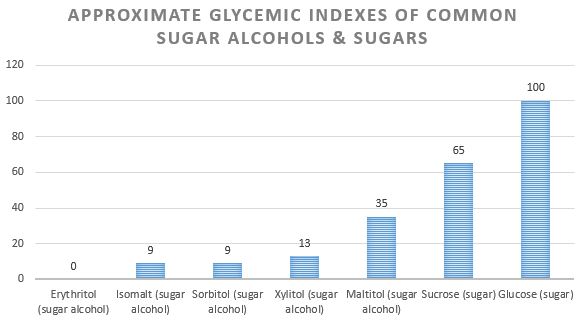If you are following or considering a medical ketogenic diet or modified Atkins diet (MAD) for the management of intractable epilepsy, you may have heard talk about sugar alcohols and whether they are compatible with the diet. In today’s blog post, ketogenic dietitian Stacey Bessone will tell us more about sugar alcohols and what role they play with the medical ketogenic diets.
 Sugar alcohols are a specific type of carbohydrate called “polyols”. Sugar alcohols are naturally occurring in fruits and vegetables and often added to foods as a reduced-calorie alternative to sugar. Some common sugar alcohols you may see in food ingredient lists include:
Sugar alcohols are a specific type of carbohydrate called “polyols”. Sugar alcohols are naturally occurring in fruits and vegetables and often added to foods as a reduced-calorie alternative to sugar. Some common sugar alcohols you may see in food ingredient lists include:
- Malitol
- Sorbitol
- Isomalt
- Xylitol
- Erythritol
It’s important to be aware that some sugar alcohols may cause some people to experience bloating, gas and diarrhea, even when consumed in small amounts.
Sugar Alcohols & Glycemic Index
Interestingly, most sugar alcohols are incompletely absorbed in the small intestine, so they do not raise blood sugar the same way as sucrose (table sugar). However, since they are partially absorbed, they may affect blood glucose levels to some degree. This can be observed by looking at the glycemic indexes of sugar alcohols compared to sugar. Glycemic index is a measure of the increase in blood glucose when a food is digested and absorbed. It is based on a numeric scale from zero to 100, where the glycemic index of glucose (a type of sugar you get from foods and the form that your body uses for energy) is 100. The glycemic index of sucrose (table sugar) is around 65, whereas the glycemic indexes of the main sugar alcohols are between 0 and 45. Therefore, sugar alcohols may raise your blood glucose, although not as much as sugars like sucrose and glucose.
One specific type of sugar alcohol, Erythritol, is metabolized differently than other sugar alcohols. Erythritol is fully absorbed in the small intestine and excreted in the urine unchanged, so it does not affect blood glucose levels like other sugar alcohols. As you can see in the chart above, the glycemic index of erythritol is zero.
Calories in Sugar Alcohols
Sugar alcohols provide fewer calories per gram compared to regular carbohydrates. Sugar alcohols are therefore often used as a reduced-calorie alternative to sugar.
Sugar Alcohols, Erythritol, and the Ketogenic Diet
So, are sugar alcohols allowed on the medical ketogenic diet and modified Atkins diet (MAD)? Technically, most sugar alcohols should be counted as regular carbohydrates and kept to a minimum on the medical ketogenic and modified Atkins diets (MAD). Although they may affect blood glucose differently in different people, most sugar alcohols have the potential of raising blood sugar. The exception to this rule is erythritol, since it is metabolized differently and does not affect blood glucose. I generally tell my medical ketogenic diet and modified Atkins diet (MAD) patients that when reading a food label for carbohydrate content, erythritol is the only sugar alcohol that can be deducted from total carbohydrate content. I also tell my patients that sugar alcohol can only be deducted from the total carbohydrate amount if erythritol is the only sugar alcohol used in a product. When other sugar alcohols are used in addition to erythritol, the sugar alcohol content cannot be deducted, so I tell my patients to read the food label’s ingredient list carefully.
Speak to Your Healthcare Provider
Each dietitian has his/her own protocols, so while I allow my medical keto patients to deduct erythritol but no other sugar alcohols from total carbohydrate content, your provider may have different recommendations. As always, it’s important to speak to your dietitian about which foods and ingredients are allowed for your unique diet.
– Stacey
For more information on the medical ketogenic diet for epilepsy, visit http://ketogenicdietforepilepsy.com/.
I was paid by Nutricia for my time to write this blog post, however, my opinions are my own.
The medical ketogenic diet for epilepsy should be used under medical supervision.
[i] Regnat K, Mach RL, and Mach-Aigner AR. Erythritol as sweetener—where from and where to? Appl Microbiol Biotechnol. 2018; 102(2): 587–595.
[ii] Livesey G. Nutr Res Rev. Health potential of polyols as sugar replacers, with emphasis on low glycaemic properties.2003 Dec;16(2):163-91.



 Follow
Follow Traveling for the holidays? We want to make sure you have no trouble taking your
Traveling for the holidays? We want to make sure you have no trouble taking your 